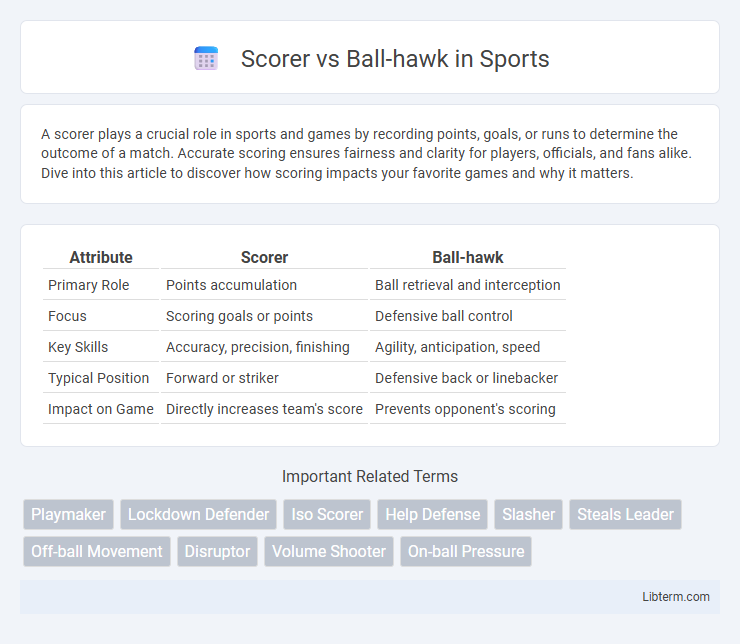A scorer plays a crucial role in sports and games by recording points, goals, or runs to determine the outcome of a match. Accurate scoring ensures fairness and clarity for players, officials, and fans alike. Dive into this article to discover how scoring impacts your favorite games and why it matters.
Table of Comparison
| Attribute | Scorer | Ball-hawk |
|---|---|---|
| Primary Role | Points accumulation | Ball retrieval and interception |
| Focus | Scoring goals or points | Defensive ball control |
| Key Skills | Accuracy, precision, finishing | Agility, anticipation, speed |
| Typical Position | Forward or striker | Defensive back or linebacker |
| Impact on Game | Directly increases team's score | Prevents opponent's scoring |
Understanding Scorer and Ball-Hawk Roles
The roles of scorer and ball-hawk in football differ significantly in responsibilities and skill sets. A scorer specializes in converting opportunities into points through precise positioning and accuracy, often focusing on goal-oriented plays and finishing techniques. Conversely, a ball-hawk excels at intercepting passes, reading the opponent's offense, and disrupting plays to regain possession, emphasizing defensive awareness and agility.
Key Attributes of a Scorer
A scorer excels in precision, consistency, and the ability to convert opportunities into points under pressure, showcasing superior hand-eye coordination and tactical awareness. Key attributes include quick decision-making, spatial positioning to exploit defenses, and refined shooting technique that maximizes scoring efficiency. Unlike a ball-hawk, whose primary role is disrupting plays and gaining possession, a scorer focuses on offensive execution and maintaining scoring momentum for the team.
Ball-Hawk: Definition and Characteristics
Ball-hawk is a defensive player in football known for exceptional ability to intercept passes and disrupt offensive plays through aggressive ball-hunting skills. Unlike scorers who primarily focus on accumulating points, ball-hawks excel in reading quarterback intentions, anticipating routes, and securing turnovers to shift game momentum. Key characteristics include high football IQ, outstanding hand-eye coordination, quick reflexes, and relentless pursuit of the ball in coverage.
Scoring Efficiency vs. Defensive Prowess
Scorers excel in scoring efficiency by converting high-percentage shots and maintaining a robust field goal percentage, significantly impacting a team's offensive output. Ball-hawks demonstrate exceptional defensive prowess through their ability to anticipate passes, generate steals, and disrupt opponents' offensive rhythm. Balancing scoring efficiency and defensive skill sets creates well-rounded players who can influence the game on both ends of the court.
Impact on Team Dynamics
Scorers drive a team's offensive momentum by consistently converting opportunities into points, boosting morale and maintaining pressure on opponents. Ball-hawks enhance defensive strength through aggressive ball recovery and turnovers, disrupting opposing plays and creating counterattack chances. The interplay between a prolific scorer and a tenacious ball-hawk fosters balanced team dynamics, ensuring both offensive firepower and defensive resilience.
Famous Scorers in Basketball History
Famous scorers in basketball history such as Michael Jordan, Kobe Bryant, and Kareem Abdul-Jabbar are renowned for their scoring prowess and offensive skillsets, making them iconic figures in the sport. These elite scorers possess an ability to consistently create points, leveraging techniques such as mid-range jump shots, three-pointers, and post moves to dominate defenses. In contrast to ball-hawks who focus on defensive rebounds and steals, scorers prioritize offensive output and scoring efficiency, often leading their teams in points per game and clutch performances.
Legendary Ball-Hawks in the Game
Legendary ball-hawks in football exhibit exceptional ability to anticipate and intercept passes, transforming defense into offense and significantly influencing game outcomes. Unlike pure scorers who focus primarily on touchdowns, ball-hawks like Ed Reed and Rod Woodson redefine defensive success through their game-changing interceptions and return yards. Their mastery of reading quarterbacks and positioning makes them invaluable assets, combining defensive prowess with scoring potential to dominate the field.
Scorer vs. Ball-Hawk: Statistical Comparison
Scorer vs Ball-Hawk: Statistical Comparison reveals distinct performance metrics emphasizing offensive versus defensive impact in football. Scorers typically contribute high points through touchdowns and field goals, with average yardage gains exceeding 80 yards per game, while Ball-Hawks excel defensively, recording interceptions, pass deflections, and tackles averaging 3+ turnovers per season. Advanced analytics indicate scorers increase win probability by scoring efficiency, whereas Ball-Hawks influence outcomes by disrupting opponent drives and generating turnovers, highlighting complementary roles essential for team success.
Building a Balanced Team Strategy
Building a balanced team strategy requires integrating both scorers and ball-hawks effectively. Scorers contribute by consistently generating points through aggressive offense, while ball-hawks excel in creating turnovers and disrupting opponents' plays. Optimizing player roles based on these strengths enhances overall team performance and adaptability on the field.
Scorer and Ball-Hawk: Who Holds Greater Value?
Scorers consistently deliver offensive value by generating points and driving team success, while ball-hawks excel in defensive play by creating turnovers and disrupting opponents. The value of scorers is often highlighted by their direct contribution to the scoreboard, yet ball-hawks provide crucial defensive stability and momentum shifts. Teams prioritizing championship contention typically seek a balance, but scorers often hold greater market value due to their visible impact on game outcomes and scoring efficiency.
Scorer Infographic

 libterm.com
libterm.com